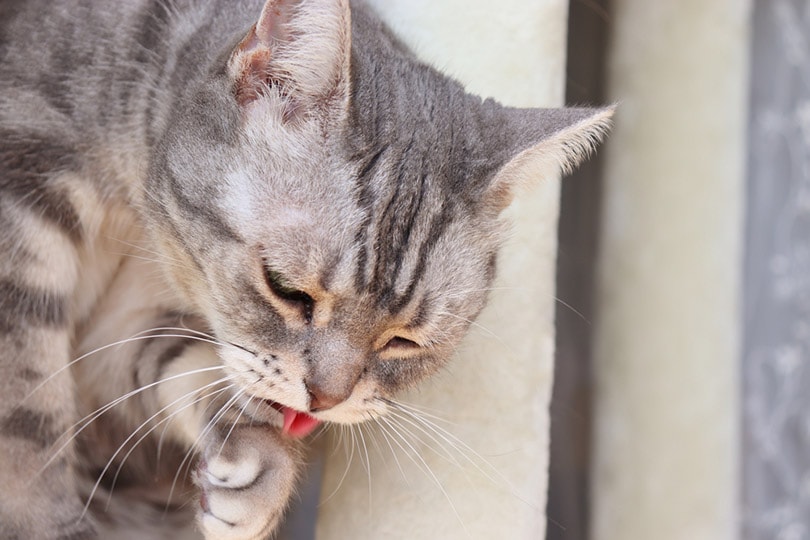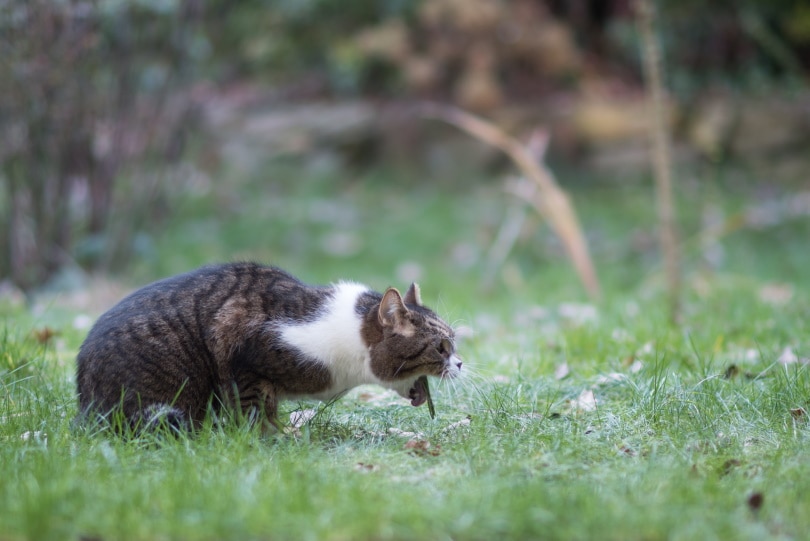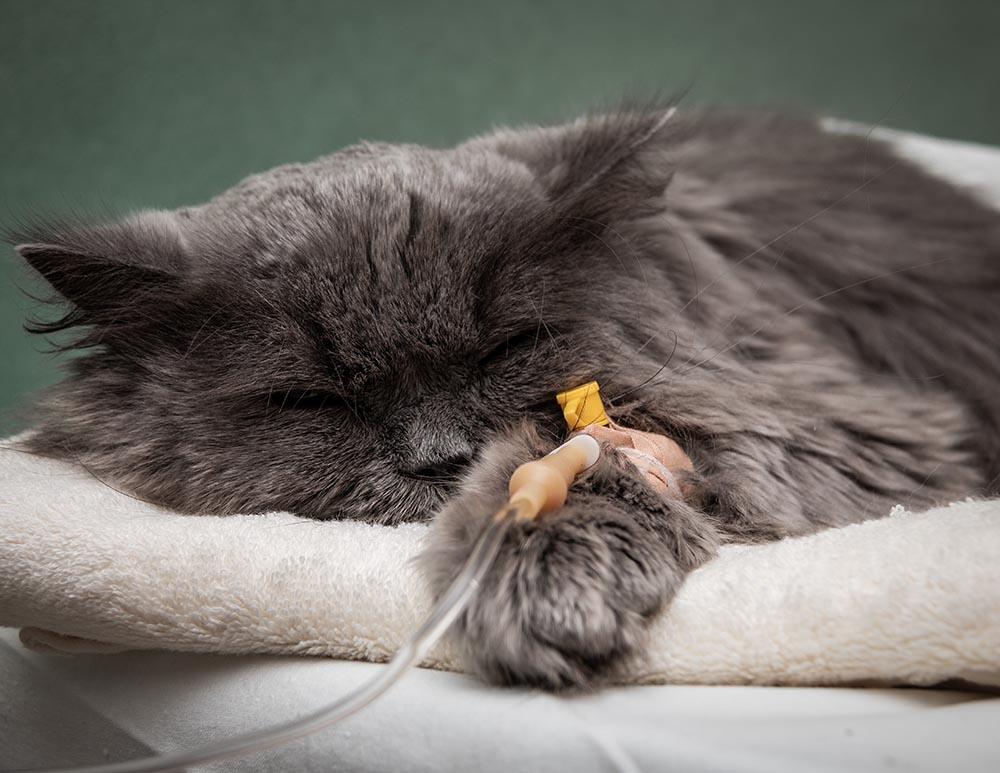
Cats sometimes seem indestructible when they run through the house at full speed while avoiding multiple obstacles, but their stomachs and digestive systems can slow them down when they’re not functioning correctly. Occasional vomiting of clear liquid is not uncommon with felines, but you should take your pet to the doctor if the symptom occurs more than once a month. Vomiting can have several causes, some are minor, and others are severe, but the veterinarian’s examination and tests are critical for determining the proper treatment for your pet.
The 10 Reasons Why Cats Throw Up Clear Liquid
1. Indigestion
When a cat vomits clear liquid, it can signify that it’s experiencing indigestion. Indigestion can occur if a cat skips a meal, consumes a bitter plant, or does not follow a routine eating schedule. Stomach acid can irritate the cat’s gut and cause it to throw liquid that’s clear or yellow. Luckily, most cases of indigestion can be treated with medications at home, but your veterinarian may run additional tests to ensure the cat is not vomiting because of a severe medical condition.
Your veterinarian may suggest switching to a bland diet until the cat’s symptoms improve or administering anti-nausea drugs. Cats that do not improve from treatment can be examined for other conditions causing indigestion, including inflammatory bowel disease, food allergies, and food intolerance.
2. Changes in Diet

Cats are notoriously picky about their food, and some have problems adjusting to a new diet. Cats that reject their new meals may choose to eat less, and their unsettled stomachs can cause them to vomit clear liquid. Like canines, some cats struggle with eating too fast, which can also cause vomiting.
Replacing a cat’s entire meal with a new brand can be overwhelming to the animal, and the cat may decide to skip the food and wait for you to return to the old brand. Veterinarians recommend introducing new meals gradually for a week or more. Finicky cats may take longer to get used to the new meals, and you have to be patient with the transition and avoid forcing them to eat something they find unappealing.
Adding small portions of the new food every day and reducing the old brand by the same amount is ideal for transitioning to new brands. If your cat eats too fast, you can place the food in puzzle boxes to slow the eating down and challenge its hunter instincts.
3. Hairballs
During the grooming process, cats ingest hair, and most of it is expelled through the feces. However, the undigested pieces can remain in the stomach and eventually form into hairballs. When your pet vomits a hairball, you may see clear liquid accompanied by the cylindrical gray tube.
Brushing your cat’s coat every week can remove more of the loose hair that could be swallowed during grooming, but a cat that coughs up hairballs more than once a month should be examined by the doctor. The veterinarian may suggest switching to a cat food formulated to reduce hairballs or using a medication that helps the hair travel through the digestive system. If symptoms persist, the vet will examine the cat for other medical conditions using blood tests, an endoscopy, radiograph, or ultrasound.
- Related read: 4 Easy Home Remedies for Cat Hairballs (Vet Answer)
4. Drinking Water on an Empty Stomach

Cats require fresh drinking water to stay healthy, but some cats drink too fast on empty stomachs and vomit clear liquid. Felines that mostly eat dry food require more water than pets on wet diets, but the veterinarian should examine cats that abruptly increase their water intake.
A severe medical condition can cause increased thirst or urination, and your vet will run tests to rule out disease as the reason. Some of the conditions that can lead to problems with excessive thirst include hyperthyroidism, kidney disease, urinary tract infections, and diabetes.
5. Ingesting Poison
Cats enjoy exploring their homes, but they often discover objects or substances that can harm them. When they consume a toxin, vomiting is a common symptom. Household cleaners and automotive chemicals are well-known poisons that should be kept away from pets, but your cat should also avoid these toxic items:
Identifying the substance that caused your cat to vomit can help the veterinarian determine the appropriate treatment. The length of the recovery process can depend on the type and amount of poison swallowed. A cat must be monitored while recovering from a toxin, and most vets will request follow-up visits to ensure the animal responds to the treatment.
6. Bilious Vomiting Syndrome

If your pet is throwing up bile early in the morning or late at night, the cause could be bilious vomiting syndrome. The liver produces bile to aid digestion when it enters the small intestine, but it can enter the stomach and cause discomfort and vomiting. The syndrome is rare in cats, and it mainly occurs in older felines.
If the veterinarian does not detect another severe disease that is causing the vomiting, they can prescribe drugs that lower the level of acid in the stomach or strengthen the gut’s ability to process food. Cats diagnosed with bilious vomiting syndrome can benefit from eating smaller meals throughout the day and at the end of the night. Most felines respond well to treatments when owners follow the doctor’s recommendations.
7. Parasites
Intestinal parasites are also responsible for vomiting in cats. Depending on the parasite, cats can vomit clear liquid or bile with streams of blood. A cat can get infections from parasites when it comes in contact with infected feces or animals with the parasites. Cats who hunt rodents and share litter boxes with infected felines are more vulnerable to illness from parasites. Over-the-counter worm medications are available online and at pet stores, but you should wait until the doctor determines which worm is causing the symptoms before administering treatment.
Although some pet parents prefer using DIY treatments instead of prescribed drugs to treat worms, veterinarians strongly oppose treating cats with pumpkin seeds, carrots, garlic, vinegar, or any homemade medicine. Following the doctor’s treatment plan, including dewormers and other medications, is the best way to help your cat recover from a parasitic infection.
8. Kidney Disease

When a cat’s kidneys are not functioning correctly, the toxic buildup can cause vomiting and other symptoms such as dehydration, weight loss, excessive thirst, and diarrhea. Acute kidney failure can be reversed if promptly treated, but there is no cure for chronic kidney disease. However, a cat suffering from a chronic case can live for several years by following the doctor’s treatment plan.
Since doctors cannot cure chronic kidney disease, their primary concern is to decrease the disease’s progression. Treatments for renal failure may include a low-protein diet, intravenous fluids, vitamin injections, potassium supplements, and possibly surgery to remove obstructions.
9. Gastritis
When a cat’s stomach becomes inflamed, the irritation can cause pain and vomiting. Gastritis can be caused by minor problems such as changes in diet or eating a toxic plant, or it can be related to severe conditions like diabetes or kidney disease. Minor cases of gastritis can clear up in a few days, but it’s better to visit the veterinarian when your cat frequently vomits.
If the doctor discovers a serious disease is not causing gastritis, they may prescribe a bland diet, antacids, pain relievers, or anti-nausea drugs. Veterinarians typically do not prescribe antibiotics to treat gastritis because they can do more damage by decreasing the number of healthy bacteria in the stomach.
10. Cancer

Intestinal lymphoma is the most common cancer diagnosed in cats. Symptoms of the disease include vomiting, appetite loss, diarrhea, and weight loss. Veterinarians may use endoscopy or surgery to obtain biopsies to diagnose lymphoma.
Although cats can be treated for lymphoma with steroids for several months, some pets must visit the doctor for chemotherapy or radiation therapy. While lymphoma cannot be prevented, vets recommend vaccinating cats against FeLV to reduce their chances of contracting cancer.
Conclusion
Although watching your feline cough up clear fluid is alarming, you cannot treat the symptom until you understand the cause. A single vomiting episode is not a reason to rush to the animal hospital, but frequent vomiting should be treated immediately by a veterinarian. Early treatment can benefit the animal’s recovery and reduce the probability of the condition worsening.
Featured Image Credit: chie hidaka, Shutterstock








